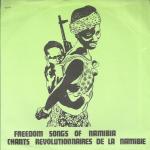You are currently browsing the category archive for the ‘Political’ category.
 The excellent UK-based African music website Natari says of Libya:
The excellent UK-based African music website Natari says of Libya:
A bit of a musical desert (excuse the pun) with very little home grown musical output. Relies mainly on Egyptian music. I did ask the Swiss Embassy some years ago (they were looking after our interests at the time) if they could help source some music from Libya but they said all that was available was “Egyptian or Ghaddaffi sings the Nolans” beat that for a reply from an Embassy if you can.
When I first read this a few years ago, I found it hilarious. It wasn’t until relatively recently that I realized that it is also quite true, though a few months ago I found my first Libyan 7”s from the 1960s, which are so good that they may someday end up on this blog. But first I feel compelled to post something else that is no doubt more emblematic of modern Libya – or at least what passed for Libya until recently. This album is dedicated to Col. Muammar Qaddafi and his Great Socialist People’s Libyan Arab Jamahiriya. Like Qaddafi, this album is bombastic, stylish (in a dated, 1970s way), committed to people’s revolution, and absolutely freaking insane.
Today’s album fits the Swiss embassy’s reply to a T. It is a thoroughly unhealthy but delicious mixture of catchy disco-pop cheese and pro-Qaddafi socialist zeal. I laughed so hard when I first put this on that I nearly shot boha out of my nose. It is so pro-Qaddafi, so pro-Libyan socialist revolution…I was shocked to find that virtually nothing about it is actually Libyan. A fairly quick Google search revealed that Joe Cutajar is actually a famous Maltese singer, who even performed on that country’s 1972 Eurovision song contest entry. Bayzo is also Maltese, and likewise represented Malta in 1993’s Eurovision contest, with music much like what’s on this LP. The song performed at that contest was composed by Alfred Sant, lyrics authored by Ray Agius. That same songwriting team wrote the majority of the songs on this LP. Additionally, the album was recorded and pressed in Italy (albeit under the direction of the Overseas Broadcasting Department of the Socialist People’s Libyan Arab Jamahiriya). One of several quotes from Qaddafi’s “Green Book” reproduced in large print on the bottom of the gatefold sleeve reads “Partners, Not Wage Workers”. Does that mean that the army of Maltese musicians that apparently propped up the Socialist Disco Department of the Libyan government didn’t even get paid?! “Revolution”, indeed!
Various Artists- Jamahiriya (The Voice of Friendship and Solidarity, 1980)
Joe Cutajar – Jamahiriya
Bayzo – Young Men Say (It’s O.K. In Libya Today)
 Prolonged contact with record traders in the former East Bloc countries has led me to amass a small collection of political propaganda records, usually in the form of pleasant but sterile pop or operatic tunes about the greatness of the Party, the Leader, and the Homeland. Since receiving my first commie agit-prop vinyl from a friend in Bulgaria about a dozen years ago, I’ve found similar recordings from Palestine, Lebanon, Iraq, India, and elsewhere. I tend to prefer these non-European political recordings, as the state orchestras that dominate the catalogues of labels like Balkanton and Melodiya are a bit too reserved and bland for my taste.
Prolonged contact with record traders in the former East Bloc countries has led me to amass a small collection of political propaganda records, usually in the form of pleasant but sterile pop or operatic tunes about the greatness of the Party, the Leader, and the Homeland. Since receiving my first commie agit-prop vinyl from a friend in Bulgaria about a dozen years ago, I’ve found similar recordings from Palestine, Lebanon, Iraq, India, and elsewhere. I tend to prefer these non-European political recordings, as the state orchestras that dominate the catalogues of labels like Balkanton and Melodiya are a bit too reserved and bland for my taste.
Political music from Africa, however, is another matter. There are the big names like Fela Kuti and Thomas Mapfumo who certainly paid dearly for their boldness in addressing political topics, and made wonderful, vital and energetic music in the process. There are also a plethora of other recordings connected to various specific political movements, particularly during the period of decolonization of Africa that arguably ended in the 1990s. The first successful decolonization movement of that decade on African soil led to the liberation of the southern African country of Namibia, which won its independence from apartheid-ruled South Africa on March 21, 1990 following the end of the 22-year long Namibian War of Independence in 1988.
The belligerent on the Namibian side of the conflict was a guerrilla organization known as the South West African People’s Organization (SWAPO), formed in 1966 after decades of Namibian resistance organized around the Lutheran Church (brought to Namibia by the country’s original colonial occupier, Germany). A choir composed of SWAPO partisans is heard on today’s recording, taken from a 4-song EP called Freedom Songs of Namibia released in Belgium. According to the back sleeve, the songs on this EP were recorded in Lusaka, the capital of Zambia, and used as the soundtrack to the film SWAPO Fights to Liberate Namibia (Politifilm, Brussels). Searching Google for that title brings up several SWAPO posters from 1974-1975 bearing that slogan, so I’m guessing these recordings were probably made around that time.
As in the case of other former guerrilla organizations in Africa (like the MPLA in Angola or the EPRDF in Ethiopia), since independence SWAPO has transformed into the country’s dominant political party.
SWAPO- Freedom Songs of Namibia (Agitat, date unknown)
